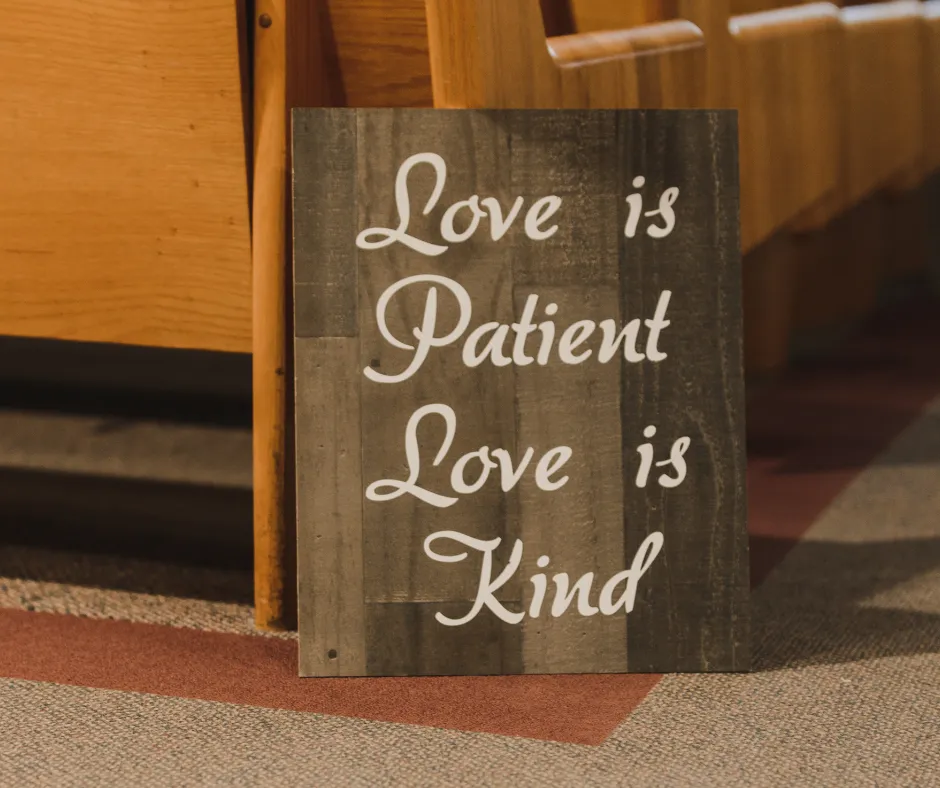In today’s world, many challenges and events can test our ability to love as Christ loves. We see hate, intolerance, and division all around us. However, if we take the teachings of 1 Corinthians 13 to heart, we can be the light of Christ in a dark world.
1 Corinthians 13 is part of Paul’s letter to the church at Corinth, where he addresses problems within the church community. In this context, he emphasizes that love is the foundation of all Christian relationships and actions. This scripture teaches us that God’s love is patient, kind, and selfless. It is not envious, boastful, or proud.
Instead, it rejoices in truth, bears all things, believes all things, hopes all things, and endures all things. God’s love is unchanging and everlasting, always seeking to do good for others and never seeking its own gain.
These attributes of love are accurate not only of God’s love but also of the qualities Christians should strive to embody in their lives. When we choose to love others with patience, kindness, and humility, we reflect the love of God in our interactions with others. We build bridges instead of walls, foster unity instead of division, and demonstrate Christ’s love to a world that desperately needs it.
Historical Background:
1 Corinthians 13, often referred to as the “Love Chapter,” is a passage from the New Testament Bible, written by the Apostle Paul in his first letter to the Corinthians. This letter was composed in the mid-50s AD when Paul was in Ephesus, Asia Minor (modern-day Turkey). The city of Corinth was a thriving and diverse metropolis in southern Greece, known for its cultural, intellectual, and commercial significance.
Paul established the church in Corinth during his second missionary journey (Acts 18:1-17). However, after his departure, the young and diverse Christian community faced various challenges, including divisions, immorality, and doctrinal disputes. In response to these issues and questions raised by the Corinthians, Paul penned this letter to provide guidance, correction, and encouragement.
The Message of 1 Corinthians 13:1-13:
Verse 1: “If I speak in the tongues of men and of angels, but have not love, I am only a resounding gong or a clanging cymbal.” This verse tells us that even the most impressive gifts or abilities are meaningless without love. Love is the foundation of all genuine Christian service.
Verse 2: “If I have the gift of prophecy and can fathom all mysteries and all knowledge, and if I have a faith that can move mountains, but has not love, I am nothing.” This verse emphasizes that love is more important than spiritual gifts or profound knowledge. Without love, these things are meaningless.
Verse 3: “If I give all I possess to the poor and surrender my body to the flames, but have not love, I gain nothing.” This verse shows us that even self-sacrifice is meaningless without love. True giving comes from a heart of love, not just a desire to do good deeds.
Verse 4: “Love is patient, love is kind. It does not envy; it does not boast; it is not proud.” This verse describes the attributes of love. Love is patient, meaning that it endures even under challenging circumstances. It is kind, meaning that it seeks to do good for others. It does not envy, boast, or engage in prideful behavior.
Verse 5: “It is not rude, it is not self-seeking, it is not easily angered, it keeps no record of wrongs.” This verse continues to describe the attributes of love. Love is not rude or selfish and does not hold grudges or seek revenge.
Verse 6: “Love does not delight in evil but rejoices with the truth.” This verse tells us that love always aligns with what is right and true. It does not take pleasure in wrongdoing but rejoices in goodness and righteousness.
Verse 7: “It always protects, always trusts, always hopes, always perseveres.” This verse summarizes the enduring nature of love. Love protects, trusts, hopes, and perseveres even in the face of trials and challenges.
Verse 8: “Love never fails. But where there are prophecies, they will cease; where there are tongues, they will be stilled; where there is knowledge, it will pass away.” This verse emphasizes that love is eternal and unchanging, while other gifts or abilities are temporary.
Verses 9-12: These verses discuss the limitations of our current knowledge and understanding. We see only a partial reflection of God’s truth, but when we are with Him face to face, we will know fully.
Verse 13: “And now these three remain: faith, hope, and love. But the greatest of these is love.” This final verse sums up the central message of the chapter. Faith and hope are important, but love is the most essential quality for Christians to possess.
Consider:
Emily lived in the bustling city of Newbridge. She was a nurse at the city’s largest hospital, known for her dedication and compassion towards her patients. Emily grew up in a loving Christian home where her parents taught her the importance of love, inspired by the teachings of 1 Corinthians 13.
One day, Emily received a new patient, a homeless man named Sam. He was brought to the hospital, weak and malnourished, after collapsing on the streets. The other staff members were hesitant to interact with him, wary of his unkempt appearance and the unpleasant smell surrounding him. But Emily approached him with kindness, treating him with dignity and respect.
As she cared for Sam, Emily recalled the words of 1 Corinthians 13: “Love is patient, love is kind. It does not envy; it does not boast; it is not proud.” She demonstrated this love through her actions, patiently listening to Sam’s story and comforting him when he cried.
Sam had been abandoned by his family and forced to live on the streets. He struggled to survive, facing rejection and judgment from those around him. But Emily’s genuine love and compassion stirred something deep within him. He began to open up to her, sharing his fears and dreams.
Over time, Emily’s unwavering love and the teachings of 1 Corinthians 13 sparked a transformation in Sam. He found hope in the possibility of a better life and started to believe that he was worthy of love. Emily helped Sam find a place to stay and connected him with resources to get back on his feet.
Word of Emily’s actions spread throughout the hospital, inspiring her colleagues to treat their patients with greater love and empathy. The once hesitant staff members began to see their patients through the lens of love, just as Emily had shown them.
Eventually, Sam found a job and a home. He dedicated his life to helping others in need, volunteering at a local shelter, and sharing the message of 1 Corinthians 13 with those he encountered. He always remembered the love Emily had shown him and the teachings that had transformed his life.
In the end, Emily’s unwavering love and the teachings of 1 Corinthians 13 had the power to heal a broken heart and change a life. Through her actions, Emily demonstrated that love is indeed the greatest gift we can give and receive, and it is through love that we can make a difference in the modern world.
Applying His Word to Life:
- How can you intentionally practice and cultivate the qualities of love described in 1 Corinthians 13 (such as patience, kindness, humility, and perseverance) in your daily interactions with family, friends, and even strangers? How can focusing on these attributes improve your relationships and reflect Christ’s love for others?
- Reflect on your motivations when using your spiritual gifts, talents, or abilities to serve others or participate in church activities. Are these actions genuinely rooted in love, or are there instances where pride, personal gain, or a sense of obligation may drive your actions? How can you align your motivations with the selfless, sacrificial love that Paul emphasizes in this passage?
- 1 Corinthians 13:4-7 lists several aspects of love, such as not being envious, boastful, or easily angered. Identify one or two areas where you might struggle to exhibit love as described in this passage. What practical steps can you take to address these challenges and grow your ability to love others more fully and unconditionally?
Lesson Topic Questions:
- What does love with patience and kindness mean, and how can we cultivate these qualities in our relationships with others?
- How can we love our enemies, as Jesus teaches us, and what role does forgiveness play in this kind of love?
- In what ways does “love never fails” challenge our cultural ideas of success and achievement, and how can we apply this concept in our personal and professional lives?
- What does it mean to “see through a glass dimly,” and how can we find hope and comfort in this idea when facing trials and struggles?
WANT TO LEARN MORE?
Get more information and more lessons in the Topical Readings Bible Study here!


